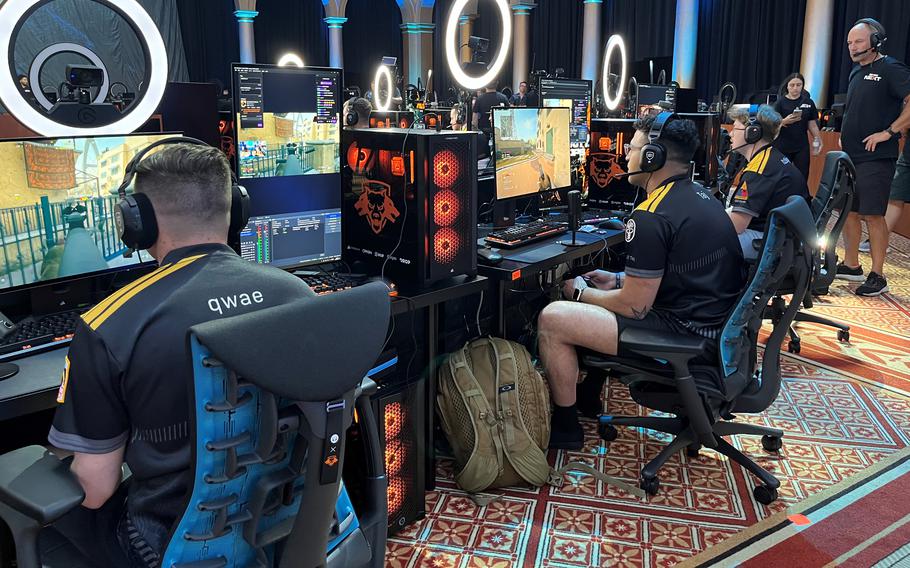
The U.S. Army esports team prepares for a match at Call of Duty Endowment Bowl V in Washington on Aug. 28, 2024. (Brian Bowers/Stars and Stripes)
WASHINGTON — The U.S. Army captured bragging rights as the year’s top military Call of Duty team, defeating squads from the U.S., U.K. and Canadian armed services.
While the U.S. Marine Corps’ team claimed a win in the final of four matches, the soldiers’ consistent play earned them the Call of Duty Endowment Bowl’s glittering trophy, which was presented by Marine Corps Commandant Gen. Eric M. Smith.
The most valuable player was Army Staff Sgt. Monsef Taj, but he shared the credit.
“My teammates went crazy,” Taj said, with trophy in hand. “… We had the vibes. We had the chemistry going. We were unstoppable.”
Call of Duty Endowment Bowl V featured the first-person shooter’s Warzone multiplayer mode. The event was also used to promote the franchise’s upcoming Call of Duty: Black Ops 6.
Getting into the event had the feeling of a black op. Our three-member team received minimal information until the week of the event. We were then sworn to secrecy concerning the location, not for military operational security but for Activision’s secrecy.
When we arrived at the venue — the National Building Museum in Washington — we were cleared by the gatekeepers and escorted into the immense atrium.
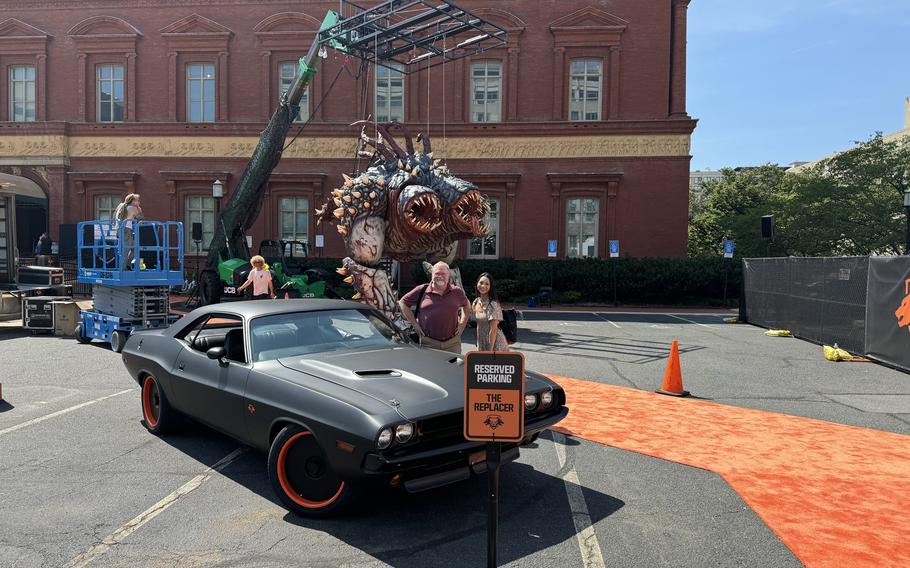
The entrance to the National Building Museum for the CODE Bowl. (Sam Weinstein/Stars and Stripes)
A Polaris all-terrain vehicle, tricked out motorcycle and showcases of military gear decorated the edges. Enormous banners hung from the ceiling. And at its core were stations for about 260 streamers from around the world who were competing in Warzone.
When we arrived, the streamers were still going full bore — running, shooting, sliding and detonating across the Warzone map.
The event was organized by the Call of Duty Endowment, which was established in 2009 to help fund veteran employment efforts. It has helped place 125,000 vets in new jobs, according to its website.
In addition to the streaming competition and the CODE Bowl, the event provided further information about the Call of Duty Endowment Pack, coming out for Call of Duty: Black Ops 6 on Oct. 25, and information on Call of Duty: War Zone Mobile.
But the streaming and announcing eventually ended. The technical glitches were resolved. And the teams of military gamers parachuted into the streets of an Eastern European city.
The esports teams were from the U.S. Army, Air Force, Space Force, Navy, Marine Corps and Coast Guard, and the British Army, Royal Navy, Royal Air Force and Royal Canadian Air Force.
The CODE Bowl is an annual competition. Last year, the Royal Canadian Air Force joined the tournament and emerged victorious. In 2022, Britain’s Royal Air Force claimed the trophy. And in 2021, Space Force won and celebrated by sending the trophy into space.
On Wednesday, each service fielded two teams, each with two service members and one big-league streamer — except for the Marines, who received assistance from country star Kane Brown.
The military esports teams are formed in several ways. The Navy’s sailors are on three-year assignments to the team.
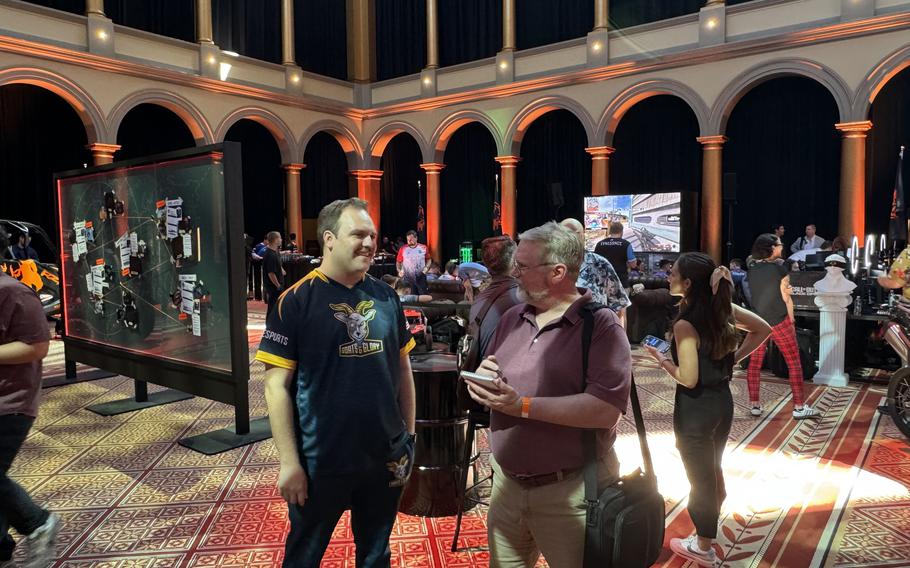
US Navy’s Lt. Aaron Jones gets interviewed by legendary Assistant Managing Editor Brian Bowers. (Sam Weinstein/Stars and Stripes)
“It’s our full job for three years,” said Lt. Aaron Jones, a plank owner and coach of Navy’s esports team.
Coast Guard members try out for one-year stints but remain in their regular jobs. Some others have a pool of players to draw from.
While excelling in different competitive video games is the teams’ focus, Jones said their overriding purpose is to enhance recruiting efforts. They go to colleges, conventions and competitions to get the word out about their service.
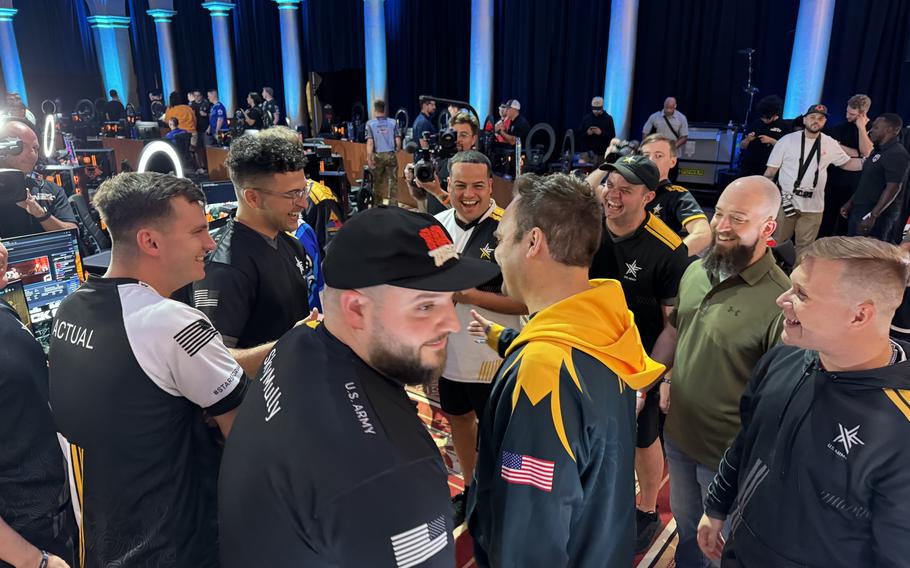
Lt. Aaron Jones is reminded by the US Army E sports team that he promised to shave his mustache if Navy lost. (Sam Weinstein/Stars and Stripes)
Much about competitive Call of Duty would be familiar to any gamer, but competitive matches are more intense.
“It’s more advanced, getting more rotations, getting more kills,” said Sgt. 1st Class Randy Ojeda, who has been on the Army’s team since 2019.
And being familiar with team members helps, said Coast Guard Lt. j.g. Nazere Jones. Knowing how teammates will move and react helps them act as one.
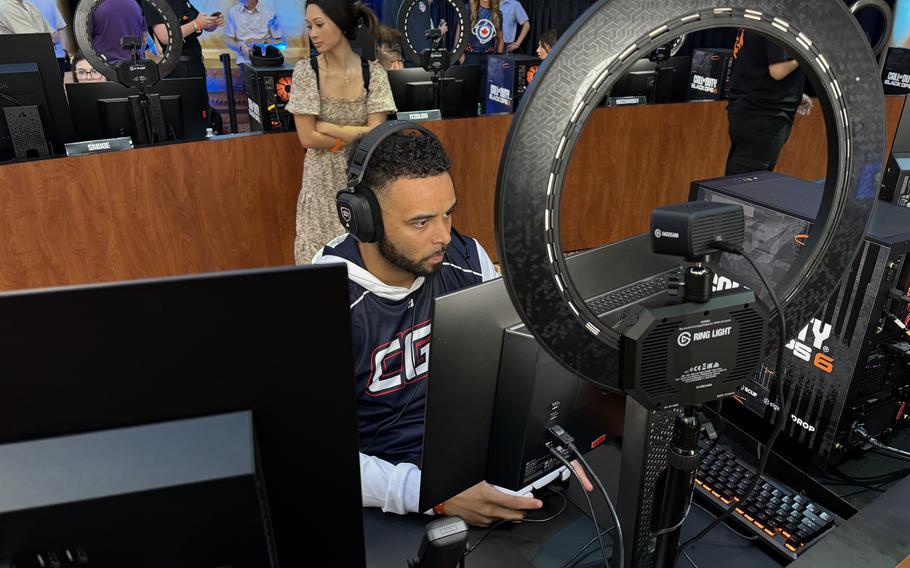
Coast Guard Lt. j.g. Nazere Jones practices playing before the CODE Bowl begins. (Sam Weinstein/Stars and Stripes)
“The more times you play with a team, you get the experience of what the realm of possibilities is,” the Coast Guard’s Jones said.
While recruiting might be the goal, there’s one reward every team is striving for.
“It’s just the bragging rights,” the Coast Guard’s Jones said.